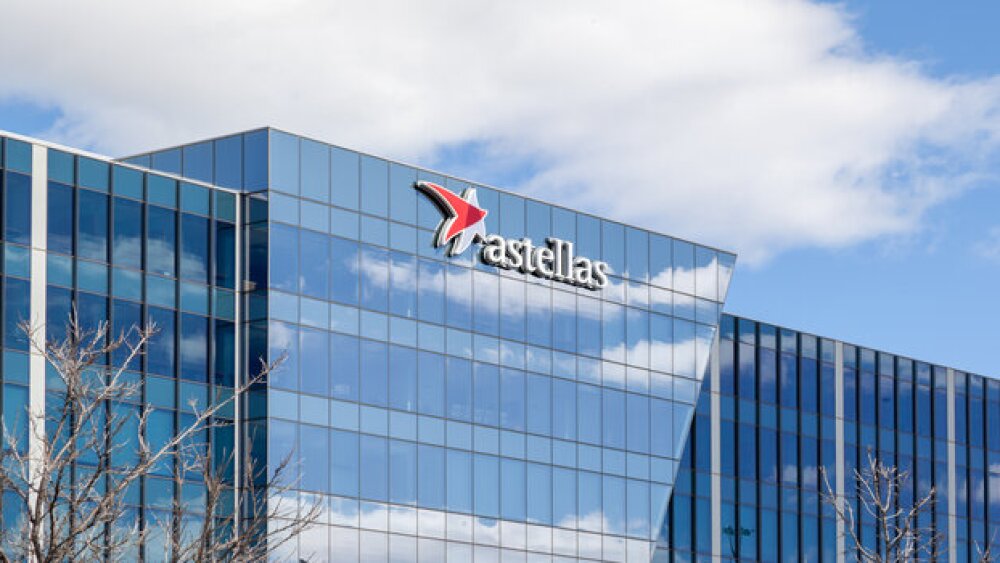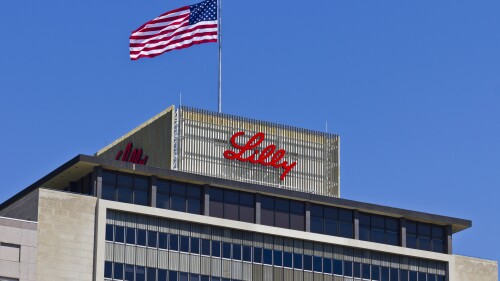The discounts should be compared against the drugs’ “ultimate net price” rather than their indicated list price to gauge the true impact of the negotiations, BMO Capital Markets analysts said.
Imfinzi is the first immunotherapy approved for perioperative use to treat gastric and gastroesophageal junction cancers.
A coordinated national effort is emerging to bring alternatives to animal testing into routine preclinical use, backed by a fresh FDA roadmap and a global coalition of scientific and industry partners.
The FDA approved an intrathecal form of Novartis’ spinal muscular atrophy gene therapy Zolgensma on Monday, broadening access to patients two years and older in what one Stanford Medicine professor called a “game changing advance” for the field.
Novo Nordisk’s amycretin showed no weight-loss plateau over 36 weeks in patients with type 2 diabetes, suggesting its efficacy could become even stronger with longer follow-up, according to analysts at BMO Capital Markets.
Tecvayli plus Darzalex led to an 83% boost to progression-free survival versus the current standard therapy in relapsed or refractory multiple myeloma, results analysts at Guggenheim Securities called “remarkable.”
FEATURED STORIES
Small and large drugmakers alike have made big, proactive moves to secure the production capacity that will be vital to serving the weight loss market.
The FDA’s proposed Rare Disease Evidence Principles review process is a starting point for getting rare disease therapies across the finish line, but industry leaders say there are more concrete steps the regulator could take to help patients.
With AbbVie’s $1.2 billion acquisition of Gilgamesh Pharmaceuticals’ lead depression drug, the psychedelic therapeutics space has soundly rebounded from Lykos’ rejection last year. There are now seven programs in Phase III trials across the sector, with multiple companies vying for that first approval.
A decade-long journey has come to an end for Stealth BioTherapeutics and the Barth syndrome community with the first-ever treatment for this uncommon mitochondrial disease. CEO Reenie McCarthy called it a “pivotal victory” that “offers hope for expedited regulatory attention to other ultra-rare diseases.”
After a tension-packed two days that saw recommended changes to the MMRV vaccine schedule and COVID-19 vaccine access, as well as a delayed hepatitis B vaccine vote, policy experts expressed concern with the reconstituted committee’s dearth of previous experience and understanding of their role.
A complex state vs. federal regulatory scheme allows drug compounders to advertise drugs without disclosing risks like a pharma company must do. Experts say it’s time for the FDA to crack down.
LATEST PODCASTS
In this episode of Denatured, BioSpace’s Head of Insights Lori Ellis discusses key themes from BIO and DIA, including the funding environment, with Rich Daly, CEO of Catalyst Pharmaceuticals, Peter Ronco, CEO of Emmes Corporation, and Phil Vanek, founder of Redline Bio Advisors.
Another patient has died from acute liver failure after receiving Sarepta’s gene therapy for DMD ; After a quiet start to the year, M&A is back with one deal for a gene editing biotech reinvigorating that sector; and RFK Jr. installs a suite of new vaccine board members who share his skeptical views on vaccines.
HHS Secretary Robert F. Kennedy Jr. made waves this week, firing the remaining members of the CDC’s Advisory Committee on Immunization Practices; Metsera’s amylin drug produced weight loss of 8.4% at 36 days; and FDA leaders gathered last week to discuss the future of cell and gene therapy, a sector that has been in turmoil since the ousting of CBER Chief Peter Marks.
Job Trends
Turnstone is shifting resources to focus on clinical advancement of its selected tumor-infiltrating lymphocyte therapy as three C-suite members exit their roles.
Subscribe to GenePool
Subscribe to BioSpace’s flagship publication including top headlines, special editions and life sciences’ most important breaking news
SPECIAL EDITIONS
In this deep dive, BioSpace investigates China’s rise as a biotech powerhouse.
In this deep dive, BioSpace explores the next big thing in obesity.
BioSpace did a deep dive into biopharma female executives who navigated difficult markets to lead their companies to high-value exits.
DEALS
-
In the second biggest acquisition of the year, Merck gains the commercial COPD drug Ohtuvayre, which could help offset the loss of revenue when Keytruda’s patent expires later this decade.
-
Analysts said the deal with Novo was likely giving Hims “‘credibility’ or increased consumer traffic,” adding that the “litigation risk is back on the table” now that the Danish pharma has stepped away.
-
The deal marks an end for CAR T company Cargo Therapeutics, which has been slashing its workforce and cutting programs since the January decision to halt its lead candidate for a certain type of aggressive large B cell lymphoma.
-
After the FDA rejection of Zurzuvae in one type of depression and the triple failure of neuro asset dalzanemdor, Sage was searching for a path forward at the end of December 2024. Biogen CEO Chris Viehbacher spied a possible deal, but the smaller company wasn’t interested.
-
Why did two private equity firms with more than $460 billion under management want a little old gene therapy biotech called bluebird bio? We wanted to know.
WEIGHT LOSS
-
A draft copy of an upcoming MAHA report reveals a strategy in lockstep with recent HHS actions such as reviving the Task Force on Safer Childhood Vaccines; Viking Therapeutics reports robust efficacy from mid-stage oral obesity candidate but is tripped up by tolerability concerns; Novo Nordisk wins approval for Wegovy in MASH; and Lilly takes a pricing stand.
-
Viking Therapeutics’ VK2735 achieves a 10.9% placebo-adjusted weight loss at 13 weeks, but a less than ideal safety profile marred the results.
-
While the 10-fold increase in dose over injectable Wegovy has raised questions about the launch, Novo Nordisk has assured investors it has the manufacturing capacity to roll out oral semaglutide without restrictions on supply.
-
Patients who are prescribed Wegovy or Ozempic can now use GoodRx to access the medications at just $499 a month if they skip insurance. This is not the first time Novo has partnered with a pharmacy to offer the blockbuster drugs.
-
The Boston-based AI/ML startup focuses on endocrine and cardiometabolic diseases and will use that expertise to generate new small molecule obesity medications for Lilly.
POLICY
-
The CDC no longer recommends COVID-19 vaccines for healthy children and healthy pregnant women, a position that has been opposed by leading medical societies.
-
The Trump administration’s ever-changing tariffs and Most Favored Nation drug pricing are part of a blizzard of unclear, potentially illegal tactics that leave observers throwing their hands in the air.
-
A new study in JAMA contradicts a series of statements made by HHS Secretary Robert F. Kennedy Jr. that paint vaccine advisory committees at the CDC and FDA as hopelessly corrupt.
-
A draft copy of the Make America Healthy Again Commission’s latest report, obtained by Politico, focuses on vaccine-related injuries and expediting access to investigational medicines for children—even though the FDA has recently rejected several of them.
-
The move comes after Robert F. Kennedy Jr. received pressure from the Children’s Health Defense, an anti-vaccine non-profit that he co-founded, which last month sued him over his failure to run the “statutorily required Task Force on childhood vaccine,” according to the lawsuit.
Odds are, you won’t love every job. Is that OK? And what should you do if you’re struggling to find happiness at work?
While biopharma professionals cited age discrimination as an issue in a new BioSpace report, it’s not the only factor affecting older and younger people’s job searches.
Learn how to discuss career gaps and how to be a great hiring manager and interviewer.
Dry promotions include new titles and responsibilities without higher pay. What should you do if you’re offered this type of promotion?
By understanding the different types of difficult bosses, you can shift your perspective and approach the situation from a less stressful, more effective angle.
Despite the benefits of hiring foreign-born STEM employees, some companies avoid it largely due to unfamiliarity with the visa process, according to two recruitment experts.
HOTBEDS
REPORTS
In this Employment Outlook report, BioSpace explores current workforce sentiment, job activity trends and the prospective job and hiring outlook for 2025, particularly as it compares to the previous year.
BioSpace’s third report on diversity, equity, inclusion and belonging in life sciences examines dramatic shifts in attitude around diversity initiatives.
CANCER
-
According to reporting from multiple outlets, Richard Pazdur, head of the Oncology Center of Excellence at CDER, opposed the consensus opinion of CBER staff to approve the drug. Replimune’s stock has dropped precipitously since the rejection.
-
The company expects that the U.S. COVID-19 vaccination rate will be “maybe a couple of points lower” than the prior level of around 20% but that pricing and Comirnaty’s market share will hold steady.
-
The pivotal Phase II trial is testing Allogene’s CAR T candidate cemacabtagene ansegedleucel for large B-cell lymphoma. ALLO-647 was being used as a preparative lymphodepletion therapy.
-
After decades of limited progress—owing to the difficulty of treating the disease and resultant market risk—glioblastoma research is entering a new phase spurred by smarter trials, targeted funding and renewed interest from companies like Merck and Jazz Pharmaceuticals.
-
Sarepta’s Elevidys is back on the market for ambulatory patients with Duchenne muscular dystrophy, Health Secretary Robert F. Kennedy Jr. reportedly plans to dissolve the U.S. Preventive Services Task Force and “fix” the vaccine injury compensation program, Merck, AstraZeneca and more report Q2 earnings, Novo names a new leader and Roche’s trontinemab impresses at AAIC25.
NEUROSCIENCE
-
Praxis’ vormatrigine reduced seizures by 56.3%, an effect size that, according to analysts at Truist Securities, exceeds that of its closest competitors.
-
The FDA greenlit multiple new drugs this month and issued some notable label expansions, including for Eli Lilly’s Kisunla. Meanwhile, the regulator turned away a cell therapy for Duchenne muscular dystrophy and a gene therapy for the rare disease Sanfilippo syndrome.
-
Bristol Myers Squibb tested Cobenfy as an adjunctive treatment with atypical antipsychotics for schizophrenia in the Phase III ARISE study, which earlier this year failed to demonstrate significant symptom improvement.
-
Move over Humira, Skyrizi and Rinvoq are expected to beat the former megablockbuster’s peak sales by the end of this year.
-
Rumors of Biogen’s disagreements with Eisai have been greatly exaggerated, CEO Chris Viehbacher said during a second quarter earnings call. The partnered Alzheimer’s drug Leqembi saw sales climb 20% for the period.
CELL AND GENE THERAPY
-
Sarepta Therapeutics’ stock has dropped precipitously as questions swirl around the safety of its gene therapies. Meanwhile, the Duchenne patient community fears losing access to Elevidys while the regulator considers more drastic action.
-
After initially refusing to suspend Elevidys distribution after two deaths, Sarepta has now given in to the FDA’s request, noting the need to maintain a good working relationship with the regulator.
-
In light of recent patient deaths, the FDA has also revoked its platform designation for Sarepta’s AAVrh74 technology. The designation, granted last month, was the first of its kind to be announced publicly.
-
Amid a season of regulatory and scientific advances, experts reveal a culture of data hoarding among cell and gene therapy developers that is reinforcing fragmentation, stalling innovation and delaying access to treatments.
-
Following the death of two teenage patients with Duchenne muscular dystrophy following Elevidys treatment, Sarepta Therapeutics adds a black box warning to the gene therapy for acute liver injury and failure and parts with more than a third of employees.

















































































































































